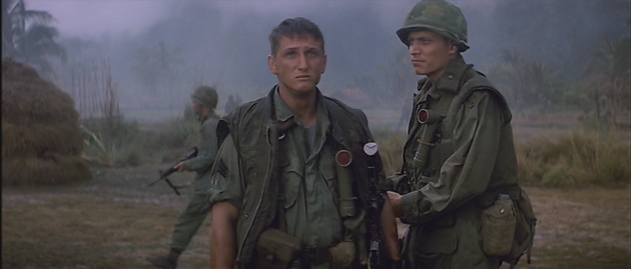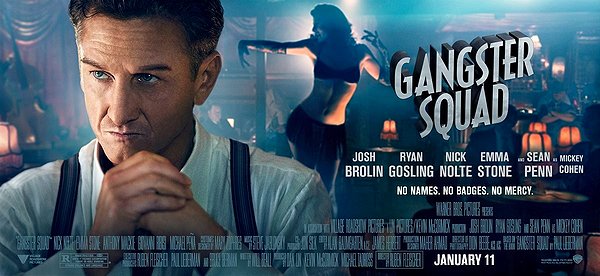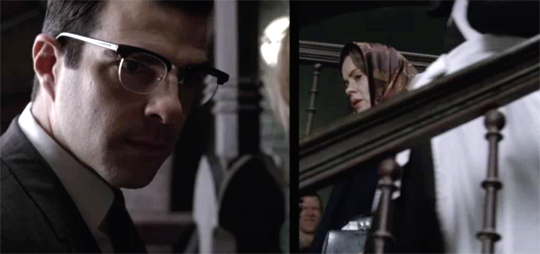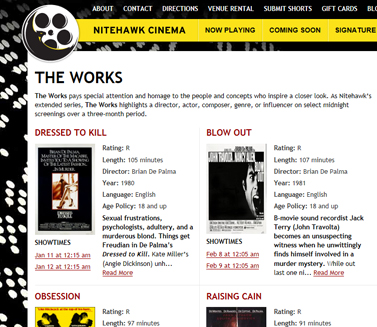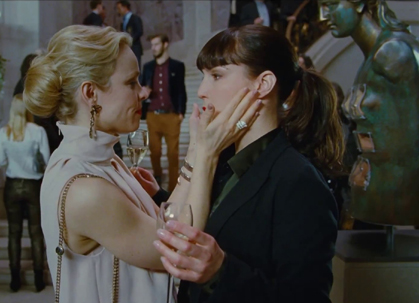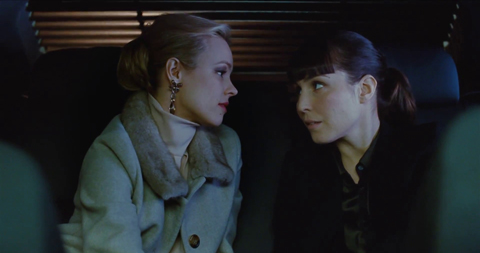MORE 'GANGSTER SQUAD' REVIEWS
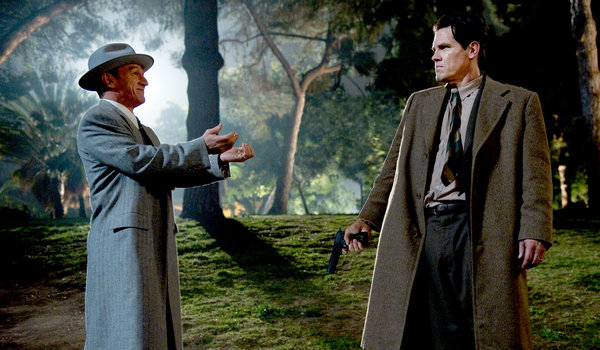 Andrew O'Hehir, Salon
Andrew O'Hehir, Salon"If you view
Ruben Fleischer’s
Gangster Squad as a violent period crime thriller in a familiar dress-up vein – as a capable imitation of better movies by
Martin Scorsese,
Brian De Palma and
Roman Polanski – it’s reasonably successful entertainment. It’s got overacting from
Sean Penn, beneath a ton of makeup, as legendary Los Angeles mob boss
Mickey Cohen, along with underacting from
Ryan Gosling as the slightly nebbishy romantic lead and down-the-middle acting from
Josh Brolin as its upright cop hero. Add in the digitally re-created, noir-flavored locations of postwar L.A. and the dazzling eye candy of
Emma Stone in terrific period dresses and heartbreaking auburn hair and, hey – by the standards of midwinter Hollywood releases, not bad at all.
"But let’s back up for a second and talk about propaganda and how it really works. I’d like to declare a temporary truce around the issue of Zero Dark Thirty and its depiction of torture, at least long enough for us to agree that the question of whether or not the film is propagandistic is now a matter of extensive public discourse. Nearly no one will raise such questions about Gangster Squad, because it does not depict recent history and because it’s a conspicuously artificial Hollywood entertainment released in January. One could argue, however, that those things make it more effective as propaganda than an overtly disturbing film like Zero Dark Thirty could ever hope to be, since the message delivery is almost invisible...
"Many superior films about the murkier eras of L.A.’s past, most prominently Chinatown and L.A. Confidential, have been profoundly shaped by an awareness of the darkness beneath the California dream. On the surface, Gangster Squad is simply a trivial entertainment that doesn’t care (Fleischer’s previous films are the comedies Zombieland and 30 Minutes or Less), but beyond that it paints a fundamentally mendacious portrait. Will Beall’s screenplay (based, to a very limited extent, on a book by Paul Lieberman) posits a lot of ludicrous patriotic conversation, in which cops stand around at backyard barbecues exclaiming that, by God, they fought Hitler for American freedom and they’ll be damned if they let Mickey Cohen take it away again."
Wesley Morris, The Boston Globe
"Gangster Squad is an almost movie. It’s almost terrible. It’s almost entertaining. But it’s missing the shameless insanity of a wonderfully bad movie, and the particular vision, point of view, and coherence of some very good ones. So it sits there in between — loud, flashy, and unnecessary.
"It’s almost like every popular movie about crooks and cops made in the last four decades, but never enough like its own movie. An extended gunfight mimics the famous train-station staircase shootout in The Untouchables. But mimic is all it does. A lot of people who’ll see Gangster Squad will also have seen The Untouchables. So they’ll watch Josh Brolin and Ryan Gosling as cops blasting their guns and sliding across marble floors and know it was better in Brian De Palma’s movie. That’s because De Palma didn’t carve up the space the way Ruben Fleischer has with Gangster Squad.
"They’ll see whatever Sean Penn is going for as Mickey Cohen, the real-life East Coast criminal who tries to take over the Los Angeles underworld in 1949, and miss Al Pacino’s Tony Montana or Robert De Niro’s Al Capone. Penn spews like a boiling radiator, which is much closer to Pacino’s Big Boy Caprice in Warren Beatty’s Dick Tracy. But Big Boy Caprice was a work of Pop Art — a Roy Lichtenstein of Tony Montana...
"Penn’s physique is to be admired more than feared or desired. He doesn’t provide menace or heat or sex. And the role doesn’t have enough going on for him to rise to the iconic, unembarrassed brazenness of Pacino in Scarface. Rather, it brings him low. The movie’s been lighted and colored so that whenever Penn does anything, he actually looks like something The Polar Express digitized. Everybody in Gangster Squad is like this. They’re almost human."
Jeffrey Wells, Hollywood Elsewhere
"Last May I speculated that Ruben Fleischer's Gangster Squad would be a low-grade L.A. version of Brian De Palma's The Untouchables. It had to bring in the under-35s, who hate yesteryear environments that aren't familiar and video-gamey, and that meant going downmarket. On 1.4, having read Michael Cieply's assessment of the film, I expressed concern that it might turn out "a little dumber and more primitive" than expected.
"Well, I saw Gangster Squad last night and it's primitive, all right. Primitive like a smart, well-trained ape. It's loutish, cocky, smirking and swaggering. I brought a digital bullet-counter to the screening, and I can report that 478,446 bullets are fired in Gangster Squad. Early on some faceless stooge gets torn into two pieces and is then eaten by coyotes. And yet -- this is the odd part -- Fleischer's film is half-intelligent. The first part is stupidly effective, and that always takes a little brains.
"Fleischer's pulpy, strutting direction and Will Beall's blunt, pared-down screenplay combine to create a hunk of mythical fantasy video-game bullshit machismo period porn, but the first act of Gangster Squad is not moronic, and for a while I was mildly entertained. It felt like it was channeling the spirit of Roger Corman's Machine Gun Kelly ('58) or Don Siegel's Baby Face Nelson (57) but with more throttle and brass-knuckles style, and with a heftier budget.
"But then it gets weighed down by repetition -- every decision by each and every character is flamboyant and basic and gorilla-crude -- and then the standard desire to out-blast the last action shoot-em-up kicks in, and Gangster Squad just goes whacko and smacko and sluggo, and then it machine-guns itself to death."
Duane Dudek, JS Online
"Although echoes of Brian De Palma's The Untouchables run through it, the no-holds-barred violence of Gangster Squad seems more inspired by De Palma's Scarface; a body tied to two cars is torn in half, complete with a bird's-eye view of the remains; a drill to the skull suggests Scarface's chainsaw-shower scene; and a slo-mo massacre in a hotel lobby decorated for Christmas is as nutty as Tony Montana's staircase shootout."
Piers Marchant, The Democratic Gazette
"The film also has significantly large shoes to fill, not only competing against the best of cinematic L.A. noir (Chinatown and L.A. Confidential to name but two sterling examples), but also against De Palma’s glittering gold standard from 1987.
"On its own merits, this film is simply not very good; compared to some of the classics that came before, it fails miserably. Instead of Costner’s Elliot Ness being forced to confront his fractured morality in order to bring justice to the loss of his men, we have a big, dumb galoot whose only play in all situations is to go barreling into danger head-on and hope that he comes out the other side. The fact that the film continuously lets him get away with it is the real crime here."
Lou Lumenik, New York Post
"The true inspiration for Gangster Squad — like so many other period films these days — is actually other movies, principally Brian De Palma’s The Untouchables, which was written by David Mamet. Unfortunately, Fleischer and Beall (a former LAPD detective-turned-novelist) take their material much less seriously than De Palma or Curtis Hanson (L.A. Confidential)...
"A shootout in a Hollywood hotel lobby is modeled on the train-station sequence in The Untouchables, but Fleischer lacks De Palma’s instincts for such subtleties as camera placement and editing, so it quickly devolves into tedium."
Rob Hunter, Film School Rejects
"Brian De Palma’s The Untouchables is a fantastic movie, isn’t it? The film weaves a story of good and evil, duty and ambition through a vaguely historical lens and comes out the other side with a movie that manages pure pop entertainment secured by serious turns of event, memorable characters and real emotional weight. Ruben Fleischer‘s Gangster Squad wants so badly to straddle that same line, but while it’s a fun, casually entertaining ride it falls flatter than Billy Drago whenever it tries to be more than a bloody and funny cartoon...
"This is a fun flick thanks to a humorous script from Will Beall, some game performances, and a director (alongside cinematographer Dion Beebe) who knows how to shoot and frame some wildly energetic action scenes against a beautifully rendered Los Angeles of old. The movie just looks good, from the set design to the costumes to Fleischer’s beloved slow-motion carnage during some fantastically staged shoot-outs and brawls. It’s also pretty damn funny with one-liners and gags delivered effortlessly by Gosling and friends.
"The problems arise when the movie tries to be anything but entertaining, and it’s here where most of the blame falls on Beall’s otherwise funny script. The jokes work, but other parts die a quick and painful death before our eyes. The biggest misfire is a romantic subplot between Wooters and one of Cohen’s dames (Emma Stone) that feels forced, dull, and lacking even an inkling of the chemistry the two shared in Crazy, Stupid, Love. It may be out of her control, but Stone doesn’t help matters by feeling completely inappropriate for the time period. She just doesn’t fit. I blame her eyes.
"The film also suffers whenever events turn serious or dark. With one exception that’s saved in the editing, the script’s attempts at emotion and loss just hang limply in the air wearing signs begging for audience reaction, but they just feel obvious and expected instead. Penn’s crime boss Cohen should feel threatening as he commits some truly heinous acts, but it’s impossible to feel genuinely unnerved by him, thanks in equal parts to his facial prosthetics that tease early concept art from Dick Tracy and his channeling of Robert De Niro’s exaggerated mugging as Al Capone.
"Speaking of The Untouchables…while few films can claim the label of truly original, it can’t go unnoticed how much of an influence De Palma’s classic really is here. In addition to the entire setup as described in the opening paragraph above there are a couple scenes lifted wholesale along with certain character deaths that match up pretty directly between the films. There are far worse films you could crib from, but still."
Matt Goldberg, Collider
"Sadly, when compared to other films in the genre, Gangster Squad can’t help but feel like a missed opportunity. Even the screenplay seems to acknowledge its limitations as characters make cursory references to their experiences in World War II. These are men who can’t stop fighting, but the weight of war never comes off as a heavy burden. Instead, Gangster Squad lightly walks in the footsteps of other crime flicks, most notably Brian De Palma‘s The Untouchables. But whereas the 1987 crime flick had memorable characters, dialogue, and a tremendous performance from Sean Connery, Gangster Squad is a fun but forgettable action flick that should be far better considering the strength of its premise and the talent of its cast."
Scott Renshaw, Isthmus
"The whole package is sporadically effective for a while, primarily in the sheer momentum it builds. It's also fairly satisfying in the places it diverges most from The Untouchables, especially when Gosling's cynical, reluctantly crusading cop flirts with Cohen's girl...
"But eventually it becomes clear that there's just not enough going on beneath the surface when it comes to character relationships. To make matters worse, the surface itself starts to feel far too familiar as Fleischer mimics the style and structure of The Untouchables."
David Edelstein, Vulture
"The period thriller Gangster Squad plays like an untalented 12-year-old’s imitation of Brian De Palma’s The Untouchables. Josh Brolin is the two-fisted cop who won’t follow the rules if that means turning a blind eye to injustice … and are you noticing that even my own language is clichéd, as if the picture’s lack of inspiration were a contagion? I’m sick of goddamned vigilantes, if only because they exist nowhere but onscreen and yet fuel the macho-paranoid fantasies of gun nuts in the real world...
"The director, Ruben Fleischer, made the mysteriously well-liked Zombieland, which cannibalized George Romero’s zombie mythos the way Gangster Squad cannibalizes De Palma’s Chicago. There isn’t a frame in the film that looks like anything other than a third-rate movie. De Palma gave us operatic grandeur; Fleischer, dinner theater with an overqualified cast. This is a movie empowered by top agents, the ones who tell a Gosling or Stone that they need to mix crowd-pleasing, big-check studio action pictures with finer, lower budget, more serious films — and then discourage those actors from doing said serious films unless the roles are obvious Oscar bait.
"Maybe the worst thing about Gangster Squad is that it isn’t egregiously terrible, that it’s competent enough to make some viewers say, 'It was dumb but I enjoyed it.' Whenever that happens at a movie like this, an angel dies somewhere. There are plenty of dumb movies that leave you more alive; this one puts a hit on your soul."
Lou Gaul, Calkins Media
"The producers of Gangster Squad should immediately mail a check — a very big one with numerous zeros — to Brian De Palma and attach a thank-you note.
"The R-rated picture lifts so many plot and character elements from De Palma’s law-and-order epic The Untouchables (1987) that the filmmaker should receive some type of recognition."
James Verniere, The Boston Herald
"Imagine Brian De Palma’s pop classic The Untouchables without Kevin Costner, Sean Connery, Andy Garcia or Robert De Niro and his baseball bat, or Ennio Morricone or De Palma’s directing flourishes. What would you have? You’d have Gangster Squad. The worst crime committed in this paltry film is plagiarism. Untouchables scribe David Mamet should get a percentage...
"The screenplay by Will Beall of TV’s Castle is based on a book by journalist Paul Lieberman, but still seems entirely derivative. Instead of Raymond Chandler or playwright Mamet (Glengarry Glen Ross), Beall’s dialogue is reminiscent of the witless cop banter on TV’s Hawaii Five-O.
"Gangster Squad, which was held from release because one of its scenes recalled the Aurora, Colo. shooting (it was reportedly cut), boasts the usual action: brutal hand-to-hand fights, a fake-looking CGI car chase and blazing shootouts with Thompson submachine guns, shotguns and pistols.
"The film notably name checks Ma and Pa Kettle, Claude Rains and Slapsy Maxie’s. I liked Penn’s performance better when Al Pacino gave it in Scarface. For his part, Brolin speaks in a mumbling, tough-guy monotone that makes O’Mara sound like he’s taken too many knocks. The retro-L.A. locales are nicely evoked, including the art deco Park Plaza Hotel, but L.A. Confidential this ain’t."
Andy Lea, Daily Star
"But director Ruben Fleischer does have something that De Palma didn't - a cracking script.
"The storyline may be far from original but the witty dialogue, delivered with relish by an impressive cast, keeps the action fizzing along nicely...
"This is by no means a bad film. It's witty, has a handsome cast and plenty of zippy action.
"But it's not one you will still be thinking of in ten years' time.
"If you are, you might be confusing it with a Brian De Palma film."
Ethan Alter, Television Without Pity
"The easiest way to ease into a discussion of Gangster Squad, the fedora-era set, City of Angels-based cops vs. crooks action movie from Zombieland director Ruben Fleischer, is to describe what the movie is not. For starters, it's not a serious take on old-school film noir in the tradition of Chinatown and L.A. Confidential. Neither is it a twisty detective story like The Big Sleep or square-jawed, no-nonsense crime picture like The Public Enemy. It's also not a richly stylized comic book take on the period like Dick Tracy. And it's definitely not a successful piece of pop art mythmaking like the film it most clearly aspires to be, Brian De Palma's The Untouchables. Above all, in case you couldn't tell already, it's also not a good movie.
"So given all the things that the movie is not, what exactly is Gangster Squad then? Well, from where I was sitting, it mainly resembled an excuse for a group of overeager kids to play dress-up in their mom and dad's clothes on a major studio's dime."
Michelle Orange, Capital New York
"Watching Brian De Palma’s Scarface for the first time, not long ago, I had a hard time divorcing the film from its myth.
"When you finally see a movie that set a thousand ripples flowing through the culture, it can appear to be a victim of its own influence, as though it were only a two-bit satellite for all those ripples and not their source.
"I was a little kid when Scarface came out but I remember its release, mainly because my father and my uncle made an outing of it. I particularly recall the two of them standing in the foyer in their overcoats, excited but stern as I sulked about being left behind. They never went to the movies together, so what made this one so special, and why couldn’t I come? 'It’s not for you,' they repeated as they swept out the door, leaving me with the bitter, mournful taste of leather-scented air.
"There are more direct references to other gangster movies in Gangster Squad, Ruben Fleischer’s garish genre wank, but like most post-1983 gangster movies (and rap videos), indirect references to Scarface abound. Of course De Palma was himself updating the original Howard Hawks version from 1932, which was loosely based on the exploits of Al Capone. Capone was said to love the film so much he had his own print.
"There’s just something about gangsters and Hollywood: they like it; it likes them. Gangster movies have been inbreeding this love for generations, producing one golden child—a Chinatown, Goodfellas, Untouchables, or L.A. Confidential—for every litter of cross-eyed duds. The best that can be said for Gangster Squad is that it secures, for now, the position of alpha dud, the fedora-capped king of clichés. It’s less a gangster movie than a gangster mutation with tommy-gun Tourette’s."
Jeff Meyers, Metrotimes
"Though it tries mightily, The Untouchables it ain’t. First of all, screenwriter Will Beall is no David Mamet. And as stylish as director Ruben Fleischer can be, he just doesn’t have the cinematic chops to match Brian De Palma. Finally, while Sean Penn’s cartoonish scenery-chewing is good for a chuckle or two, it never comes close to the operatic menace that Robert de Niro brought to Al Capone.
"Now, normally I might say that it’s not fair to hold these two films up next to each other. But Fleischer and his team invite the comparisons. Not only does De Niro’s menacing rant, 'I want him dead. I want his family dead.' get re-created by Penn as a frothing shriek of, 'I want them all dead! … I want their pets dead!' but Gangster Squad’s finale tries to emulate De Palma’s train station shoot-’em-up (which was borrowed from Sergei Eisenstein’s The Battleship Potemkin, no less) with a hotel grand staircase slow-mo tommy-gun battle that looks like an early ’90s music video. Though adequately entertaining because of its cast, relentless action and setting, Gangster Squad can’t help but play like a third-generation knockoff."
Michael Phillips, Chicago Tribune
"Some of these characters are based on the record, others are made up, and most of the dialogue is made of wood, befitting such rejoinders as: Let's give him 'a permanent vacation in a pine box!' The template for Gangster Squad, based on Paul Lieberman's nonfiction account and goosed up by screenwriter Will Beall, is clearly Brian De Palma's The Untouchables, written by David Mamet. Good template; weak variation."
Lance Harris, TechCentral
"Like Al Capone, the real Mickey Cohen was eventually pinched for tax evasion. Without spoiling the ending of the film, this is not what happens in Gangster Squad. Perhaps director Ruben Fleischer figured that he wouldn’t copy the ending of Brian De Palma’s classic The Untouchables after imitating nearly everything else about it.
"Fleischer keeps it all moving along at quite a brisk pace, though his take on the mob movie is nowhere nearly as successful as his zom-com Zombieland. Part of the problem is that he seems unsure whether he is aiming for the comic book noir of Sin City or the period authenticity of LA Confidential, resulting in a mix of uneven tones. The film also has a glossy digital look that is at odds with its post-World War 2 setting."
Matt Barone, Complex
"Which could also describe Fleischer's visual approach in Gangster Squad, a bloated, borderline animated veneer that looks and feels like Warren Beatty's Dick Tracy drained of all its enjoyable campiness. There's poorly handled, exploitation-level camp here, sure (Penn's Cohen makes his appropriately malicious debut by having a guy chained to moving vehicles and ripped in half), but Fleischer can't ever decide what Gangster Squad should be: a snappy gangster show set in a heightened reality, a gritty extension of Brian De Palma's far superior The Untouchables, or a wink-wink comedy that (desperately) seeks high-five from its audience.
"By the time Gangster Squad reaches its video-game-like climax inside the Park Plaza Hotel—where Tommy guns, bullets, an anonymous goons' corpses reach dopily high counts—it's not even worth putting into any of those thematic categories. Just file it under 'Epic Fails.'"
VIDEO: Peter Travers, Rolling Stone
"It's like gangland's greatest hits by a bad cover band."
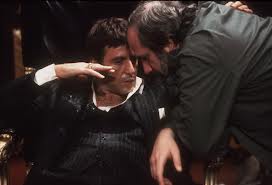 Well, I thought there was some reason Brian De Palma had suddenly dropped out of the Jason Statham Heat remake a few weeks ago. Looks like he was cooking up something big with two of his old friends. Deadline's Mike Fleming broke the news today that De Palma will reteam with Al Pacino for Happy Valley, "the working title of a film that will tell the story of Penn State head football coach Joe Paterno," according to Fleming. The focus of the film is being kept under wraps for now, but Fleming writes that "Paterno’s legend was undone by revelations he and others in the football program were aware that former defensive coordinator Jerry Sandusky was molesting children, and did little to stop it, supposedly fearing bad publicity for the powerhouse gridiron program they presided over."
Well, I thought there was some reason Brian De Palma had suddenly dropped out of the Jason Statham Heat remake a few weeks ago. Looks like he was cooking up something big with two of his old friends. Deadline's Mike Fleming broke the news today that De Palma will reteam with Al Pacino for Happy Valley, "the working title of a film that will tell the story of Penn State head football coach Joe Paterno," according to Fleming. The focus of the film is being kept under wraps for now, but Fleming writes that "Paterno’s legend was undone by revelations he and others in the football program were aware that former defensive coordinator Jerry Sandusky was molesting children, and did little to stop it, supposedly fearing bad publicity for the powerhouse gridiron program they presided over." Last September, Fleming reported that Pacino was attached to play Paterno. At that time, Nicita was named as the producer, and the project was being shopped around. In that September post, Fleming wrote, "The narrative arc of the movie that will be shopped is obvious. A man becomes the winningest coach in college football history and builds a powerhouse football program that turns him into a campus deity. When his former defensive coordinator Jerry Sandusky is revealed to be a pedophile and it comes out Paterno was told and helped hide the scandal, the coach was summarily fired. He died shortly after of cancer — and many feel of a broken heart — and the school had little choice but to raze a fabled statue of Paterno just as the NCAA dropped the hammer with sanctions against the school that included removal of Paterno’s wins going back to the cover-up. Sandusky was found guilty on 45 counts of sexual abuse against young boys and is expected to spend the rest of his life in prison."
Last September, Fleming reported that Pacino was attached to play Paterno. At that time, Nicita was named as the producer, and the project was being shopped around. In that September post, Fleming wrote, "The narrative arc of the movie that will be shopped is obvious. A man becomes the winningest coach in college football history and builds a powerhouse football program that turns him into a campus deity. When his former defensive coordinator Jerry Sandusky is revealed to be a pedophile and it comes out Paterno was told and helped hide the scandal, the coach was summarily fired. He died shortly after of cancer — and many feel of a broken heart — and the school had little choice but to raze a fabled statue of Paterno just as the NCAA dropped the hammer with sanctions against the school that included removal of Paterno’s wins going back to the cover-up. Sandusky was found guilty on 45 counts of sexual abuse against young boys and is expected to spend the rest of his life in prison."




 Last week, Ryan Murphy answered some questions about the latest episode of American Horror Story: Asylum for
Last week, Ryan Murphy answered some questions about the latest episode of American Horror Story: Asylum for 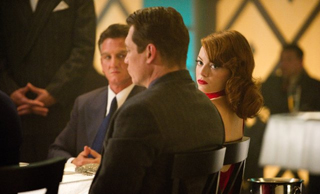 I went to see Gangster Squad today. It's a pretty good movie, and definitely pulls shot ideas from De Palma's The Untouchables, as well as other gangster movies (and the slow-motion scene in which Ryan Gosling's character turns and decides he is going to go after Mickey Cohen after all reminded me of the great Kirk Douglas slow-motion anger gun march in the big set-piece of De Palma's The Fury). In all fairness to director Ruben Fleischer, it is obvious that if he pulled from any of these shots, they are just blips in a movie he has made his own way. Gangster Squad could have been a weightier film under a different director, with this great cast and this script, but as it stands, it is a fast-paced entertainment that, while it sometimes feels a bit too slick for its own good, still manages to satisfy.
I went to see Gangster Squad today. It's a pretty good movie, and definitely pulls shot ideas from De Palma's The Untouchables, as well as other gangster movies (and the slow-motion scene in which Ryan Gosling's character turns and decides he is going to go after Mickey Cohen after all reminded me of the great Kirk Douglas slow-motion anger gun march in the big set-piece of De Palma's The Fury). In all fairness to director Ruben Fleischer, it is obvious that if he pulled from any of these shots, they are just blips in a movie he has made his own way. Gangster Squad could have been a weightier film under a different director, with this great cast and this script, but as it stands, it is a fast-paced entertainment that, while it sometimes feels a bit too slick for its own good, still manages to satisfy.